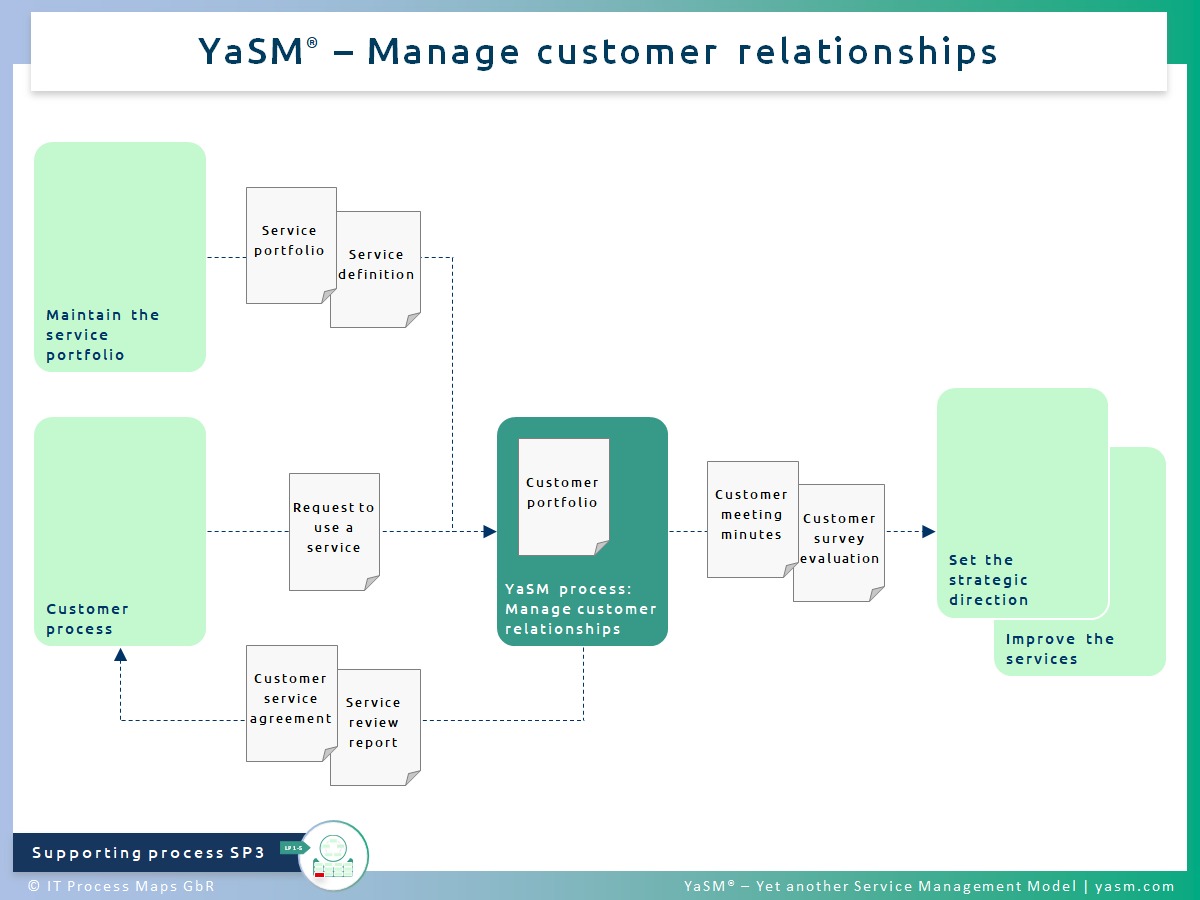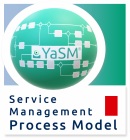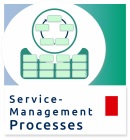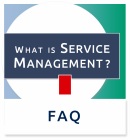SP3: Manage customer relationships
Process name: Manage customer relationships - Part of: Supporting processes
Previous process: Maintain the service portfolio
Next process: Manage configuration information
Process description
The customer relationship management process in YaSM (fig. 1) is about finding new customers for the service provider's offerings and establishing a mutually beneficial relationship with existing customers. This is achieved in particular by obtaining regular feedback from customers through customer meetings and surveys, and by dealing with customer requirements (and complaints) in a professional way.
The information gained is an important input for other service management processes, such as
- The strategic process which decides about the introduction of new services or significant enhancements to existing ones
- The service improvement process which is tasked with identifying weaknesses and improvement potentials in the current services.
CRM also takes care of negotiating and signing formal contracts (customer service agreements) between the customer and the service provider.
Compatibility: The YaSM CRM process is aligned with ISO 20000, the international standard for service management (see ISO/IEC 20000-1:2018, sections 8.2 and 8.3), and it corresponds to the practice of 'ITIL 4 relationship management'.
Sub-processes
YaSM's CRM process has the following sub-processes:
- SP3.1: Find new customers
- Process objective: To identify potential new customers and to present the service provider's offerings to those potential new customers.
- SP3.2: Sign or terminate customer service agreements
- Process objective: To sign customer service agreements with customers who wish to use the service provider's services. This process is also responsible for terminating customer service agreements which are no longer needed.
- SP3.3: Handle customer complaints
- Process objective: To record customer complaints, to assess if the complaints are justified and to determine the steps required to deal with the complaints.
- SP3.4: Monitor customer complaints
- Process objective: To continuously monitor the processing status of outstanding customer complaints and to take corrective action if required.
- SP3.5: Hold customer meetings
- Process objective: To communicate with customers on a regular basis in order to learn about their needs and plans for the future.
- SP3.6: Perform customer satisfaction surveys
- Process objective: To plan, carry out and evaluate regular customer satisfaction surveys. The principal aim of this process is to learn about areas where customer expectations are not being met before customers are lost to alternative service providers.
Process outputs
This section lists the documents and records produced by 'customer relationship management'. YaSM data objects [*] are marked with an asterisk, while other objects are displayed in gray.
- Complaint record
- A record containing the details of a customer complaint, including the actions taken to resolve the complaint. [*]
- Complaint status information
- A message containing the present status of a complaint, typically sent to a customer who earlier made a complaint.
- Customer meeting minutes
- The customer meeting minutes record the details and findings from a meeting of the service provider with one of its customers. This report is an important input for developing the service strategy and defining service improvement initiatives. [*]
- Customer portfolio
- The customer portfolio is used to record all information related to customers. The customer portfolio is the customer relationship manager’s view of the customers who receive services from the service provider. [*]
- Customer service agreement
- An agreement between a service provider and a customer for the provision of a service as specified in the service definition. A signed customer service agreement represents a commitment by the service provider to deliver a service in line with the agreed quality, at a specified cost. A single agreement may cover multiple services. [*]
- Customer survey evaluation
- The evaluation of a customer satisfaction survey, presenting the results and findings from the survey in a condensed way. [*]
- Customer survey questionnaire
- A customer survey is typically based on questionnaires, aimed at getting insight into overall customer satisfaction and customers' views on specific (aspects of) services. In many cases, answers are given using a scale, for example '1: Very dissatisfied', … , '10: Very satisfied'. [*]
- General customer agreement
- A higher-level agreement with a customer. General customer agreements are at times put in place with particular customers, covering issues regardless of the services being used. If such agreements exist, they are routinely attached to customer service agreements.
- Service definition
- A service definition specifies the service properties, in particular the offered functionality and the guaranteed service levels. Service definitions also describe how the organization's resources are used in order to provide the service. A service can be provided using one or several other (internal or external) supporting services. [*]
- Suggested process modification
- A suggestion for modifying one or several service management processes. Suggestions for process modifications or improvements may originate from anywhere within the organization.
- Suggested service modification
- A suggestion for modifying a service, for example to improve service quality or economics. Suggestions may originate from anywhere within or outside of the service provider organization.
Notes:
[*] "YaSM data objects" are those documents or records for which the YaSM model provides detailed recommendations: Every YaSM object has an associated checklist (see example) describing its typical contents, and an associated lifecycle diagram depicting how the status of the object changes as it is created, updated, read and archived by various YaSM processes (see example).
"Other objects" are mostly informal data or information where YaSM has less strong views about their contents. There are no associated lifecycle diagrams or checklists.
Process metrics
Process metrics are used, for example, to assess if the service management processes are running according to expectations.
For suggestions of suitable metrics, please refer to the list of metrics for the YaSM CRM process.
Roles and responsibilities
Process owner: Customer relationship manager
- The customer relationship manager is responsible for maintaining a positive relationship with customers. This role identifies customer needs and makes this information available to the service provider organization, so that the service provider is able to offer an appropriate range of services.
| YaSM role / sub-process | Customer | Customer relationship manager | |
|---|---|---|---|
| SP3.1 | Find new customers | - | AR |
| SP3.2 | Sign or terminate customer service agreements | R | AR |
| SP3.3 | Handle customer complaints | - | AR |
| SP3.4 | Monitor customer complaints | - | AR |
| SP3.5 | Hold customer meetings | R | AR |
| SP3.6 | Perform customer satisfaction surveys | R | AR |
Notes
Is based on: The CRM process from the YaSM Process Map.
Process description › Sub-processes › Process outputs › Metrics › Roles






